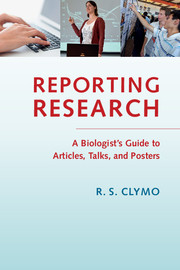2 - Speaking about your work
Published online by Cambridge University Press: 05 October 2014
Summary
You will probably get an opportunity to talk about your work before you have to write about it. You use some of the same evidence in a talk as in an article, though prepared differently, mostly in visual form with tables and figures as ‘slides’. But speaking is a performance art in real time and needs different skills from writing. When writing you have time to reconsider and revise; when giving a talk you have only one chance to get it right. Detailed preparation and at least some practice are essential. Giving a successful talk that interests the audience can be a satisfying, if nerve jangling, experience. It is a rapid way to recognition amongst peers in your subject .
When writing or showing a poster you are competing for attention, but a talk is different. Your audience is captive. This advantage is also a responsibility: the members of your audience have come hoping to learn something and, perhaps, be entertained too. The stakes are high.
- Type
- Chapter
- Information
- Reporting ResearchA Biologist's Guide to Articles, Talks, and Posters, pp. 69 - 86Publisher: Cambridge University PressPrint publication year: 2014



